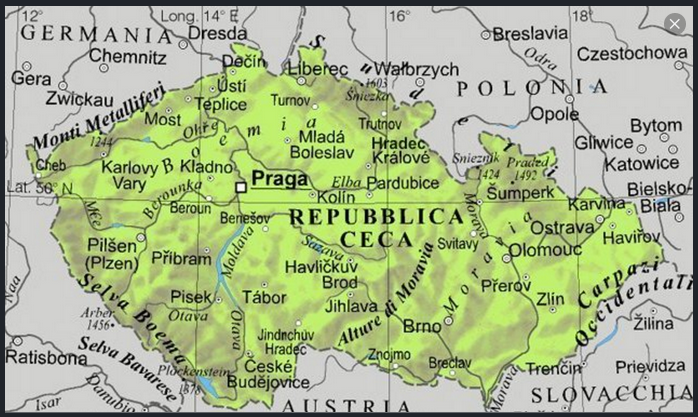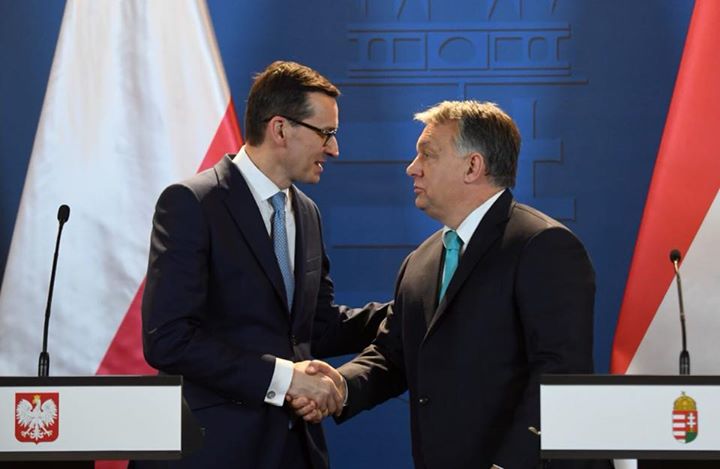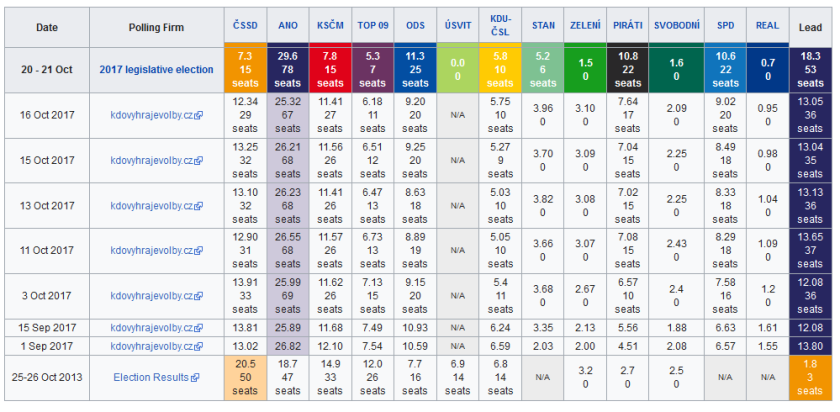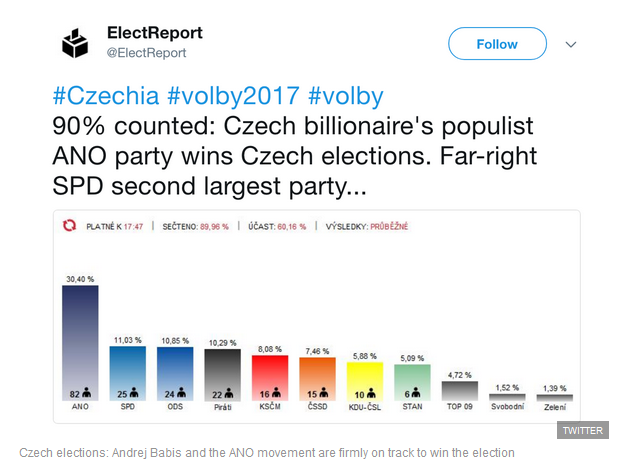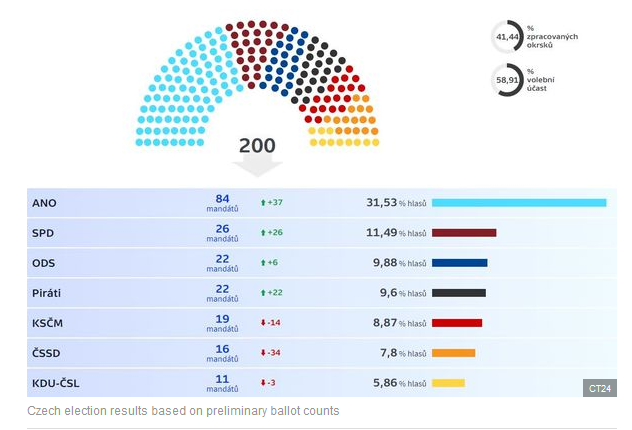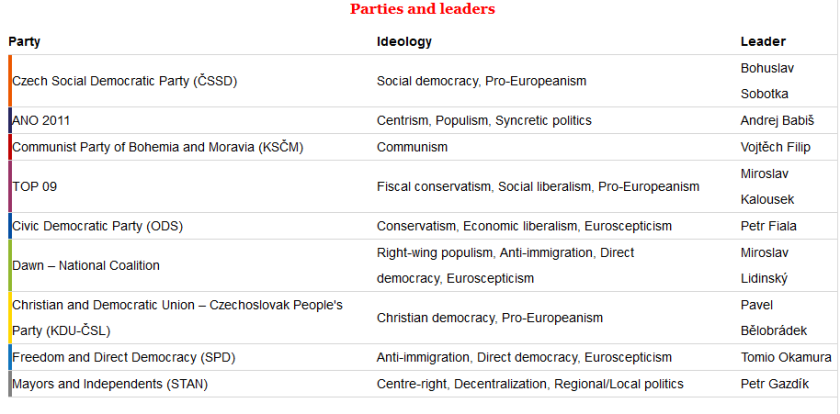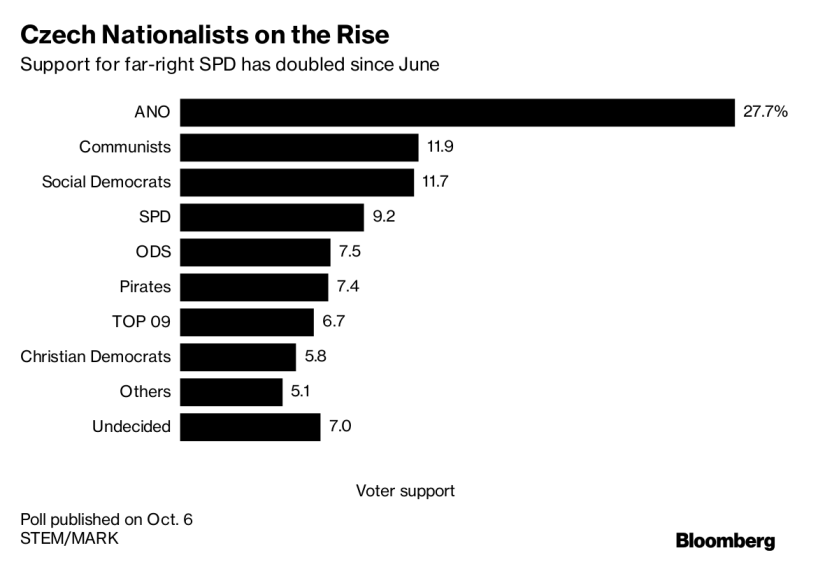Giuseppe Sandro Mela.
2021-04-19.
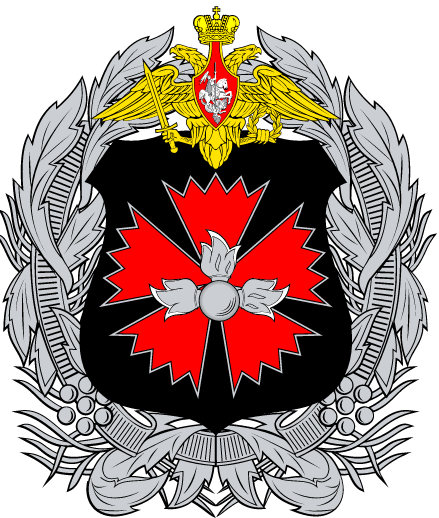
Nel gennaio del 1993 furono proclamate pacificamente e simultaneamente la Repubblica Ceca e la Slovacchia: entrambi i nuovi stati ottennero subito il riconoscimento degli Stati Uniti e dell’Unione Europea.
La Repubblica Ceca ha aderito all’Unione Europea dal 1º maggio 2004, mentre ha aderito all’area Schengen il 21 Dicembre 2007.
La Repubblica Ceca è stata ammessa alla Nato nel 1999.
Il ricordo della dominazione sovietica è tuttora molto vivo.
* * * * * * *
«The Czech Republic is expelling 18 Russian diplomats over suspicions that Russian intelligence services were involved in an ammunition depot explosion in 2014»
«The central European country is a NATO and EU member state, and the expulsions and allegations have triggered its biggest row with Russia since the end of the communist era in 1989»
«Its actions could prompt Russia to consider closing the Czech Republic’s embassy in Moscow»
«Czech Prime Minister Andrej Babis said in a briefing shown live on television that there was “well-grounded suspicion about the involvement of officers of the Russian intelligence service GRU… in the explosion of an ammunitions depot in the Vrbetice area.”»
«The U.S. embassy in Prague said on Twitter that Washington “stands with its steadfast ally, the Czech Republic. We appreciate their significant action to impose costs on Russia for its dangerous actions on Czech soil.”»
«Hamacek drew a parallel with the poisoning of Russian spy Sergei Skripal in Britain in 2018 …. they were searching for two men carrying Russian passports in connection with serious criminal activity in the names of Alexander Petrov and Ruslan Boshirov»
«Czech police said Petrov and Boshirov, whose whose birth names British government documents have given as Alexander Mishkin and Anatoly Chepigas, had also used a Moldovan passport in the name of Nicolai Popa and a Tajik one issued in the name of Ruslan Tabarov»
* * * * * * *
«Moscow reacted furiously on Sunday to Czech accusations that two Russian spies accused of a nerve agent poisoning in Britain in 2018 were behind an explosion at a Czech ammunition dump four years earlier, which killed two people»
«prompting Russia’s Foreign Ministry to vow on Sunday to “force the authors of this provocation to fully understand their responsibility for destroying the foundation of normal ties between our countries”»
«The Czech Republic said it had informed NATO and European Union allies that it suspected Russia of causing the blast, and European Union foreign ministers were set to discuss the matter at their meeting on Monday»
«Russia said Prague’s accusations were absurd as it had previously blamed the blast at Vrbetice, 300 km (210 miles) east of the capital, on the depot’s owners. It called the expulsions “the continuation of a series of anti-Russian actions undertaken by the Czech Republic in recent years”, accusing Prague of “striving to please the United States against the backdrop of recent U.S. sanctions against Russia”.»
«Czech police said they were looking for two men who travelled to the Czech Republic days before the blast under the names Alexander Petrov and Ruslan Boshirov.»
«Those names were the aliases used by the two Russian GRU military intelligence officers wanted by Britain for the poisoning of former Russian spy Sergei Skripal and his daughter with the Soviet-era nerve agent Novichok in the English city of Salisbury in 2018»
«A NATO official said the alliance would support the Czech Republic as it investigated Russia’s “malign activities”, which were part of a pattern of “dangerous behaviour”»
«On Sunday, U.S. national security adviser Jake Sullivan said Washington had told Moscow “there will be consequences” if Alexei Navalny, the opposition figurehead who almost died last year after being given a toxin that Western experts say was Novichok, dies in prison, where he is on hunger strike.»
* * * * * * *
«The Czech Republic is planning to put the construction of a new nuclear power plant at its Dukovany complex out to tender»
«Security services have demanded that Russia’s Rosatom be excluded as a security risk»
* * * * * * *
Come per tutte le situazioni che coinvolgono i servizi segreti, anche quanto sta accadendo nei rapporti tra la Repubblica Ceka e la Russia è riferito parzialmente ed è soggetto ad una pesante disinformazione. Pochi i punti fermi (si fa per dire).
– La Repubblica Ceka aderisce alla Unione Europea ed alla Nato.
– Nel 2014 era in pieno corso la guerra civile nel Donbass.
– All’epoca, per la Repubblica Ceka transitava molto materiale bellico destinato a quel teatro operativo.
– La Harris-Biden Administration ha innalzato i toni contro Cina e Russia, imponendo sanzioni sulla base di supposte violazioni degli human rights, per essi intendendo ciò che i liberal dicono che essi siano.
– La Repubblica Ceka chiama in causa il Главное разведывательное управление, Glavnoe razvedyvatel’noe upravlenie, Direttorato Principale per l’Informazione, vulgo Gru. Esso è il servizio informativo militare e dipende dalle forze armate, a differenza dell’FSB e del SVR. Fondato nel 1918, la sua esistenza fu resa nota a metà degli anni novanta. Ciò suggerirebbe più un problema militare che non uno politico civile.
– La Nato ha collocato nella Repubblica Ceka armamenti anche atomici di attacco.
– Il nodo energetico di Dukovany e la progettazione della nuova centrale atomica sono strategicamente rilevanti.
– «over suspicions»
*
Si deve solo sperare che i russi non perdano la pazienza.
*
Russia furious at accusation that Skripal suspects killed two in Czech blast
Moscow reacted furiously on Sunday to Czech accusations that two Russian spies accused of a nerve agent poisoning in Britain in 2018 were behind an explosion at a Czech ammunition dump four years earlier, which killed two people.
Prague on Saturday expelled no fewer than 18 Russian diplomats, prompting Russia’s Foreign Ministry to vow on Sunday to “force the authors of this provocation to fully understand their responsibility for destroying the foundation of normal ties between our countries”.
The Czech Republic said it had informed NATO and European Union allies that it suspected Russia of causing the blast, and European Union foreign ministers were set to discuss the matter at their meeting on Monday.
The row is the biggest between Prague and Moscow since the end of decades of Soviet domination of eastern Europe in 1989.
It also adds to growing tensions between Russia and the West in general, raised in part by Russia’s military build-up on its Western borders and in Crimea, which Moscow annexed from Ukraine in 2014, after a surge in fighting between government and pro-Russian forces in Ukraine’s east.
Russia said Prague’s accusations were absurd as it had previously blamed the blast at Vrbetice, 300 km (210 miles) east of the capital, on the depot’s owners.
It called the expulsions “the continuation of a series of anti-Russian actions undertaken by the Czech Republic in recent years”, accusing Prague of “striving to please the United States against the backdrop of recent U.S. sanctions against Russia”.
ARMS SHIPMENT
Jan Hamacek, the Czech interior and acting foreign minister, said investigators believed the blast had been intended to occur in an arms shipment after it left the depot, probably headed for Bulgaria.
Czech police said they were looking for two men who travelled to the Czech Republic days before the blast under the names Alexander Petrov and Ruslan Boshirov.
Those names were the aliases used by the two Russian GRU military intelligence officers wanted by Britain for the poisoning of former Russian spy Sergei Skripal and his daughter with the Soviet-era nerve agent Novichok in the English city of Salisbury in 2018. The Skripals survived, but a member of the public died.
The Kremlin denied involvement in that incident, and the attackers remain at large. read more
“Police knew about the two people from the beginning,” Hamacek said, “but only found out when the Salisbury attack happened that they are members of the GRU, that Unit 29155.”
Hamacek said Prague would ask Moscow for assistance in questioning them, but did not expect it to cooperate.
The Czech investigative weekly Respekt reported on Saturday that according to police investigators, the arms shipment was destined for a Bulgarian trader believed to be supplying Ukraine at a time when Russian-backed separatists were fighting government forces in eastern Ukraine.
Respekt and Czech public radio named a Bulgarian arms dealer, a man whom Bulgarian prosecutors said Russian agents had tried and failed to kill in 2015.
The news website Seznamzpravy.cz said the arms shipment may also have been destined for Syrian rebels.
“DANGEROUS AND MALIGN”
British Foreign Secretary Dominic Raab tweeted that the Czechs “have exposed the lengths that the GRU will go to in their attempts to conduct dangerous and malign operations”.
A NATO official said the alliance would support the Czech Republic as it investigated Russia’s “malign activities”, which were part of a pattern of “dangerous behaviour”.
“Those responsible must be brought to justice,” added the official, who declined to be named.
Washington also offered Prague its support.
The United States imposed sanctions against Russia on Thursday for interfering in last year’s U.S. election, cyber hacking, bullying Ukraine and other actions, prompting Moscow to retaliate.
On Sunday, U.S. national security adviser Jake Sullivan said Washington had told Moscow “there will be consequences” if Alexei Navalny, the opposition figurehead who almost died last year after being given a toxin that Western experts say was Novichok, dies in prison, where he is on hunger strike. read more
The 2014 incident has resurfaced at an awkward time for Prague and Moscow.
The Czech Republic is planning to put the construction of a new nuclear power plant at its Dukovany complex out to tender.
Security services have demanded that Russia’s Rosatom be excluded as a security risk, while President Milos Zeman and other senior officials have been putting Russia’s case.
In a text message, Industry Minister Karel Havlicek, who was previously in favour of including Russia, told Reuters: “The probability that Rosatom will participate in the expansion of Dukovany is very low.”
*
Czechs expel 18 Russian envoys, accuse Moscow over ammunition depot blast
The Czech Republic is expelling 18 Russian diplomats over suspicions that Russian intelligence services were involved in an ammunition depot explosion in 2014, its government said on Saturday.
The central European country is a NATO and EU member state, and the expulsions and allegations have triggered its biggest row with Russia since the end of the communist era in 1989.
Its actions could prompt Russia to consider closing the Czech Republic’s embassy in Moscow, a diplomatic source cited by Russian news agency Interfax suggested.
Czech Prime Minister Andrej Babis said in a briefing shown live on television that there was “well-grounded suspicion about the involvement of officers of the Russian intelligence service GRU… in the explosion of an ammunitions depot in the Vrbetice area.”
Several explosions shook the Vrbetice depot, 330 km (205 miles) southeast of Prague, in October 2014, killing two employees of a private company that was renting the site from a state military organisation.
Babis called the circumstances “unprecedented and scandalous”, while a Russian lawmaker cited by Interfax described his allegation as absurd.
The U.S. embassy in Prague said on Twitter that Washington “stands with its steadfast ally, the Czech Republic. We appreciate their significant action to impose costs on Russia for its dangerous actions on Czech soil.”
Acting Czech Foreign Minister Jan Hamacek said the 18 Russian embassy staff, identified as secret service personnel, would be ordered to leave within 48 hours.
LINK TO SKRIPAL POISONING?
Hamacek drew a parallel with the poisoning of Russian spy Sergei Skripal in Britain in 2018, and Czech police said separately they were searching for two men carrying Russian passports in connection with serious criminal activity in the names of Alexander Petrov and Ruslan Boshirov.
Those were the aliases used by two Russian military intelligence officers who British prosecutors charged with Skripal’s attempted murder. They and Moscow both denied involvement. [nL8N2MA0FD]
Hamacek said he had “decided to expel all personnel at the Russian embassy in Prague who were clearly identified by our secret services as officers of Russia’s secret services, SVR and GRU.”
The Interfax news agency cited Vladimir Dzhabarov, first deputy head of the upper house’s international affairs committee, as saying Prague’s claims were absurd and Russia’s response should be proportionate.
Skripal and his daughter Yulia were poisoned with a nerve agent in the English city of Salisbury in March 2018.
The attack prompted the biggest wave of diplomatic expulsions between Moscow and the West since the Cold War.
Czech police said Petrov and Boshirov, whose whose birth names British government documents have given as Alexander Mishkin and Anatoly Chepigas, had also used a Moldovan passport in the name of Nicolai Popa and a Tajik one issued in the name of Ruslan Tabarov.
Police said both men were believed to have been in the Czech Republic from Oct. 11 until Oct. 16, 2014, the day of the explosion. They were first in Prague and later in the eastern regions, which is where the depot is based.
Russia would not extradite them, Interfax said, citing an unnamed source.
“Russia’s main law prohibits the extradition to a foreign state of Russian citizens accused of committing a crime on the territory of a foreign state,” the source was quoted as saying.
Babis said the Czech investigation linked the suspects to a Russian military intelligence GRU unit 29155.
The New York Times reported in 2019 that 29155 was an elite unit inside the Russian intelligence system skilled in subversion, sabotage and assassination.
